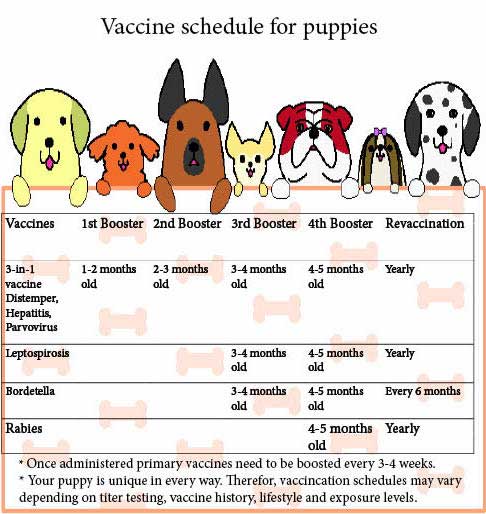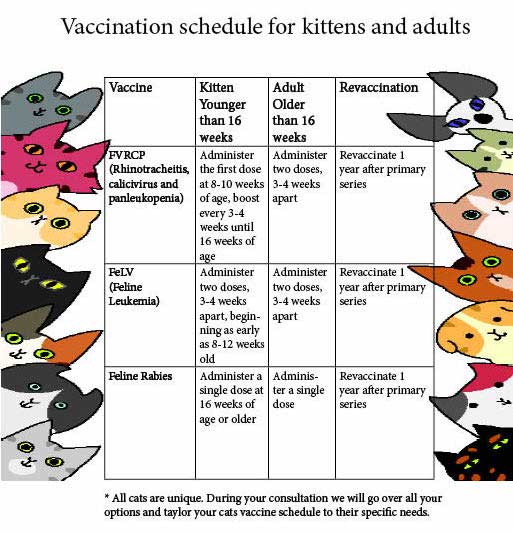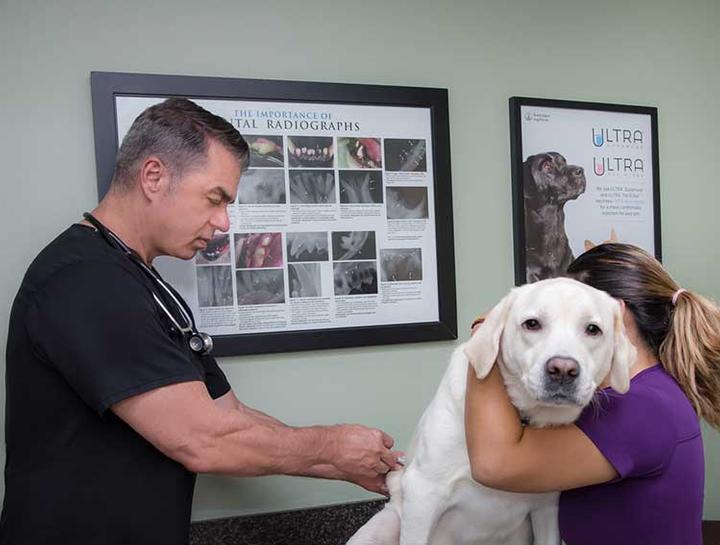Vaccinations
Provide protection against preventable diseases.
It is understandable that certain pets that stay exclusively indoors do not face the same level of threats of getting infectious diseases; compared to other pets that are regularly taken to parks, groomers and/or boarding facilities. Nonetheless, you might be surprised of everything your pet might still catch from staying exclusively indoors.
It is a myth that pets who live indoors don’t need to be vaccinated against infectious diseases. While living an indoor lifestyle is certainly safer than living outdoors, important infectious diseases can find your pet anyways.
The canine distemper virus and its other components are known as the canine distemper complex are deadly diseases that veterinarians vaccinate against. They are hardy viruses that can be brought into the home on inanimate objects like clothes or shoes. Because transmission does not require direct contact with another dog, indoor-only dogs can be exposed and become ill if they are not appropriately vaccinated. Other infectious diseases like the parvovirus that affects only dogs or the feline herpes virus can live on your clothes, hands, and shoes for an extended period of time and then be transmitted to your indoor-only pet.
The American Animal Hospital Association (AAHA) has published vaccination guidelines that reflect the current standards of vaccine science. Your veterinarian will help you understand the most appropriate vaccination schedule for your pet.
One scenario to consider that may provide an opportunity for exposure to an infectious disease, aside from an inadvertent escape from the house, is the pet who travels to the groomer periodically. Another, maybe the risk posed by a guest pet, should a family member or friend comes for a visit and have their pet with them or unsuspected wildlife roaming in your backyard (cats, squirrels, skunks, possums, raccoons, etc.). When deciding whether to vaccinate your pet, it is important to consider all the potential exposures.
What about rabies vaccination for my indoor pet?
Rabies is a human health concern, not just an animal health issue. Because rabies can be transmitted to humans and is nearly universally fatal, most communities have laws mandating rabies vaccinations of pets. Rabies is most commonly transmitted by a bite from an infected animal (like bats, skunks, and raccoons).
Here in Palm Beach County, Florida pet parents to both dogs and cats must vaccinate their pets against the rabies virus or face possible fines by the city.
Since it is highly required, your veterinarian can refuse to see or treat the pet unless it is up-to-date on its rabies vaccine or has a medical condition that prevents vaccinations.
Regardless of legal requirements, maintaining regular rabies vaccination up-to-date makes good medical sense. Even a strictly-indoor pet may find a way to sneak out of the house and be exposed to rabies by a wild animal in the neighborhood. A rabid bat could find its way inside, presenting an attractive hunting target for an indoor pet. It is simply not worth the risk to the pet or the human family members to decline vaccination against rabies.
This is why an individual risk assessment is used to determine the most appropriate disease protection and prevention plan for your pet. Your veterinarian has your pet’s best interests in mind.
Dog Vaccination: A schedule for every life stage

Do you sometimes wonder, “How often do I need to vaccinate my dog?” or “Which vaccines are required by law and which ones are not?”
It can get confusing, which is why we’re here to provide you with all of the answers.
Vaccines help prevent many illnesses that affect pets. Vaccinating your pet has long been considered one of the easiest ways to help them live a long, healthy life. Not only are there different vaccines for different diseases, but there are also different types and combinations of vaccines. Vaccination is a procedure that has risks and benefits that must be weighed for every pet relative to his or her lifestyle and health. We can help you determine a vaccination regime that will provide the safest and best protection for your individual pet.
In 2006, the American Animal Hospital Association (AAHA) published a revised version of guidelines regarding canine vaccinations. The guidelines divide vaccines into two categories – core and non-core vaccines. Core vaccines are classified based on the risk of exposure, the severity of disease or transmissibility to humans. Non-core vaccines are given depending on the dog’s exposure risks.
Puppies have a high risk of exposure due to their new and compromising immune system. Due to their levels of exposure, puppies should be vaccinated against canine distemper, parvovirus, hepatitis and kennel cough starting at 6-8 weeks of age. After the first series of these vaccines are administered, the puppy then needs to be revaccinated at 3-4-week intervals for 3 more series. Once the puppy reaches 16 weeks of age it is then appropriate to vaccinate it against the rabies virus.
Adult and senior dogs’ vaccinations will depend on your dog’s age, medical history, environment, and lifestyle. Some adult and senior dogs might receive certain vaccines annually, while other vaccines might be given every 3 years. During your consultation with us, we will be able to go over all your options and what makes more medical sense for you and your dog.
Since non-core vaccines are given depending on the exposure level your dog might face, it is vital that you share with us all the places your pet might go to. This includes traveling outside of the house or state, dog parks, beaches, training classes, groomer visits, and boarding facilities. Once we have a complete picture of your pet’s itinerary we can then determine his or her exposure levels. Please do keep in mind that if your pet is a frequent visitor to boarding or grooming facilities they will ask for up-to-date vaccine records that include both core and non-core vaccines.
Some viruses and diseases are more prevalent in some areas than others. We are pleased to offer you a wide variety of vaccines to meet your traveling pooch’s needs and to give you peace of mind. Please contact us to make an appointment to have any of the following vaccines administered to your dog:
- Rabies Vaccine
- Canine Distemper/Hepatitis/Parvovirus Vaccine
- Bordetella Vaccine (protects against canine kennel cough)
- Leptospirosis Vaccine (a bacterial disease that causes kidney and liver failure that can be transmitted to humans)
- Lyme Vaccine (a tick-born disease transmissible to humans)
- Canine Influenza (canine flu vaccine)
Over-vaccinating does not mean more immunity
Vaccinating your pet more often than necessary can be very dangerous for your pet. All vaccines have potential adverse reactions. These can range from fairly mild reactions like lethargy or soreness, to really severe ones like anaphylactic shock, autoimmune diseases, and even death. When your pet is protected by the vaccine it already had, vaccinating the pet again does not make it “more immune”.
We understand the risks associated with vaccines and do not want to expose your pet to any further possible health issues. After all, your pet’s safety is our number one priority. Here at El Cid Animal Clinic we prefer to do a simple blood test, called a “titers test. It can tell us whether your pet needs to be revaccinated or if it still has enough antigens in its system from the previous vaccination.
Vaccines and your cat

From kneading to nudging, our feline friends give us so much and ask for so little in return. These affectionate activities show that your cat trusts you and trusts that you will take care of him or her. A long, happy and healthy life for any cat starts with a preventative plan that incorporates vaccines.
More cats are infected with rabies than any other pet in the U.S., and all it takes to contract this deadly disease is exposure to an infected animal through a bite. Vaccination is an important way to help protect your pet against rabies.
Here at El Cid Animal Clinic, we are well aware that cats face greater side effects from vaccines compared to dogs. That is why we have teamed up with Merial, a world-leading animal health company providing a comprehensive range of vaccines to enhance the health, well-being, and performance of your pet. Merial is the first and only company to offer PUREVAX Feline Vaccines and is the only feline vaccine line in the market without any added adjuvants (vaccine additives that may present potential risks to feline patients). These adjuvants that are commonly put into vaccines have been associated with injection site reactions, injection site granuloma, and chronic inflammation in cats.
Since PUREVAX Feline Rabies vaccine is the only rabies vaccine made specifically for cats, we are proud to be part of this revolutionary industry change by providing the best medicine for your pet.
Even though the rabies vaccine is just one of the vaccines your cat should get, your veterinarian will be able to create with you a vaccine schedule that fits your needs and lifestyle. Other feline vaccines that we highly recommend are:
- FeLV Vaccine (protects against the feline leukemia virus and its components)
- FVRCP Vaccine (protects against the feline herpes virus, feline distemper and calicivirus [a common respiratory infection]).
- FVRCP+FeLV Vaccine (a safe, effective combo vaccine of the FeLV and FVRCP vaccine given in one injection).
Call us at (561) 832-7922 today to schedule your pet's next vaccine appointment!

